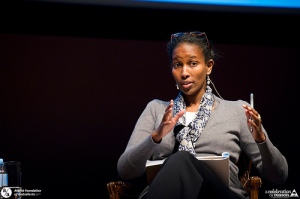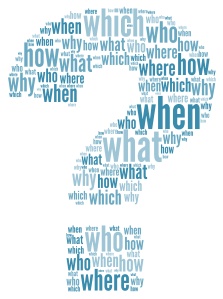Churches and religions pride themselves in having compiled in volumes all the rules by which humanity is supposed to live by and what our roles in society should be. However, what little morality can be found in the Quran can also be found in the cheapest crime novel you can find at your local gas station. The rest of it can be derived simply from common sense and from the connection people form with their fellow human beings. Unless a serious mental illness is preventing someone from acting rationally, there is no way to miss simple moral acts that enrich human experience, i.e. being kind to others, helping those in need, minding others’ fears and feelings, etc. Why? Because we can relate to all these things solely by our own experience of being alive.
Unfortunately, there are those who don’t see it this way and for them, their own interpretation of things is the only interpretation. Belief, based on these interpretations, becomes a dangerous tool to wield. Ideas can be molded into anything, and detrimentally to everyone, in the minds of those whom religion already provides a preemptive answer to everything, interpretation is not born out of logic of differentiating patterns, but rather it is the mental equivalent of muscle memory, a learned behavior with only one intended consequence- hegemony.
In religion, mainly the monotheistic Abrahamic religions, when a bad idea is sanctioned by the text from which it comes from, it is standard procedure not to question it or its origin, but rather accept it and love it as having providence in the mysteriousness of a deity almost as obscure and unknown as the people who claim to have been the messengers of it. When does it become inconvenient for us to question it or outright reject it? How far must things go before we realize that the things we are made to believe really cause pain to people? Certainly not far enough if people truly believe in this day and age that the actions of Abraham were appropriate and warranted simply because it was god’s word. How far can we go if people will be made to believe that subservience is the way to heaven? After all, not more than half a century ago people still believed that the separation between races was divinely mandated. This is an example of how diluted our common sense can become when we are made to believe things that many generations before us could not concretely explain. Must we destroy the entire world before we start to question things?
Christianity has “evolved” over thousands of years from a small insignificant rebellion to the leading form of organized “consciousness” (for lack of a better word in this context) that humanity has ever participated in. It is essentially the most deadly self-imposed psychological experiment that in one way or another has changed the world, sometimes for the worse. In its infancy Christianity was harmless, just another cult, but as its numbers inflated violently for the very first centuries, Christians were known as terrorists, rebels, and racially inferior beings (sound familiar?). They were despised, persecuted, tortured and executed. It should be funny to note that during those first centuries, the desperation of pagans seeing their gods being replaced by a foreign one must have been quite a culture shock.
Following the Constantine decree that Christianity was to become the official religion of the Roman Empire, the cult then sought to infect nations and radicalize them either by “the word” or by the sword. Early Christians experienced a sort of either-you’re-with-us-or-against-us attitude and committed atrocities in the name of unreason. Of course I can’t say this is exclusive to Christians, for earlier religions much did the same, imposing their own mythologies onto other groups of people. This new mythical thing of incredible proportions became faith. Faith then turned out to be the invisible lighthouse in the shores of reason, a place where all sailors wanted to be drawn to but that clad in obscurity it took an enormous amount of effort to find. Not surprisingly, over the centuries many ships have capsized in this place.
Much in the same way that Christianity spread its message by blood, and occasionally by peace, Islam and radicalized Muslims do the same today. Historically speaking, the spread of Islamism was much quicker and much more brutal than Christianity ever was, at least in the first centuries of its creation. Compared within the same time period, no doubt Islam would have been far more effective at indoctrinating the masses. But that is only possible admitting that Islam was born out of the sword of an illiterate warlord who sought to conquer over his oppressors come what may.
The thought that Islam under the caliphates was at one point the better of all evils, and that it advanced mathematical and scientific advancement, is one of the most recycled untruths (not lies) that we tell ourselves during our time. It is no more true than saying that we now have a deep knowledge of the universe because of Christianity. People of science and logic can be found anywhere and everywhere, it only takes the right incentive to provoke them to share their curiosity with the world. However, I cannot overlook the fact that indeed thinkers under ancient Islam were not as restricted under the banner as Christians were under Christianity. Sadly, I can’t say that about “modern” Islam. The brutality with which purely Muslim governments enforce Shari’a Law is the same with which Inquisitors enforced the canon of the Catholic church, and as a result what we have is a new inquisition period, the new Dark Ages. What’s so surprising is that heads are still rolling for imaginary crimes in an age when we can peer into the darkest spots of the known universe. Seeing the events unfold, we have the responsibility to ask ourselves and each other, “How can this possibly still be going on?”
Under the current modus operandi of Islamic nations it seems that the Quran is not taken out of context, as some might believe, but something much worse, it is understood by the most literal interpretation it can be given. If at some point we thought it was a hypocritical thing to cherry-pick the Bible to find passages that conveniently suited our moral needs, then I suggest we go back to that and try to convince our Muslim brethren to do the same. At our demise, the phrase “Beware what you wish for” comes to mind. Then again wishing that it wasn’t so is basically the secular equivalent to praying it wasn’t so.
Islam it seems has inherited the proverbial scepter of unreason. But let me clarify before I start receiving hate-mail. It is not Islam that I have a problem with, but rather literal Islam that I hate. Before we begin to convince ourselves of the fairy-tale illusion that there are many moral passages in the Quran to constitute a moral rule-book to follow, let me tell you that often in the same passages of the hadith where a moral passage can be found, an equally immoral one can also be found. The greatest problem we come across it seems is recognizing what is moral?
As if it wasn’t enough to see women clad in black and knowing that they have been genitally mutilated as children (prominent practice in some Muslim countries and also in some Christian ones), it has become the job of some cynics to declare that the people doing this sort of thing are just radicals and misunderstand and twist the word of the Quran and the Bible. What they continually fail to realize is that these “radicals” are not a band of illiterate sheepherders as they sued to be, or warriors as Mohammad himself was, but rather people of broad-reaching influence such as heads of state and religious leaders. It is not the ignorant who dictate policy, it is the learned. The radicals that we mention command armies and lead nations, these are not gangs, these are people who truly believe every word they read down to the last punctuation mark and they use it to maintain a strict control upon their populations. Whether or not this oppression exists solely for the purpose of near-total hegemonic social control, such as in the case of societies like Saudi Arabia, is something that changes from country to country, from tribe to tribe, and even within the same religion (i.e. Shia Muslims vs. Sunni Muslims, Catholics vs. Protestants, etc.) The fear that we have is not with moderate Muslims, although we should be cautious of their beliefs much in the same way that we are cautious of the beliefs of others such as Christians, Jews, and indeed my fellow atheists- our fear should be grounded in the radicalizing of these moderates as ISIL and other warring factions have effectively managed to do by spreading propaganda with the message that to wage holy war against infidels (everyone who is not a Muslim) is glorious. And what’s more, that to die is immensely better than to live. This is a highly dangerous position to take and defend. As philosopher and neuroscientist Sam Harris has said, “These people love death more than we love life.”
And if none of this convinces you of the severity of the problem then perhaps you will be more sympathetic when you realize that ISIS tortures and kills children, and all we can do is impotently watch in our computer and television screens as it happens. Does any reasonable person dare say that this is not the work of Muslims but rather the work of psychopaths misled to think this is the path to heaven?
This oppression that exists, not only of the body but mainly of the mind then becomes like a poison that kills the fertile ground of thought, and lets nothing grow. The most passive verses of the Quran are continually ignored while those which spell out in detail how to punish and control people are followed to the letter, and they work very effectively. If you thought Communism was bad, theocracy is much worse. Children are brought up thinking that this sort of behavior should be tolerated, celebrated, and repeated. In consequence we have generations upon generations and waves upon waves of faith-fighters willing to die as martyrs in defense of their twisted ideals. Teaching kids that infidels are only good for killing, or that the opinion of a woman is only half of that of a man, does not make children moral, it makes them immoral, or if anything it makes them amoral. To push the envelope a little bit further (perhaps not exaggerating), whole generations are being indoctrinated and groomed as reserves for some future holy war that some are praying, and praying hard, that will one day come. How can we hope to win a war against those who willingly walk to their deaths to defend nothing more than the right to die gloriously as we fight to defend life? It seems almost impossible. Within those circles, the interpretation that is given for men to follow has perpetuated an endless war with the perfect breed of warriors willing to die happily.
Much like the Roman Catholic Church in the Dark Ages, these Muslim theocracies appear to be highly organized even in the face of auto-radicalism. Is there a shred of doubt that they would all wish to see Israel, or the U.S., or the E.U. in ashes rather than form a peaceful world? Of course not. And it seems that money is basically the only thing keeping some of these societies at bay from erupting into war. But how long will this strategy of showering these countries with gold last? When the oil dries up and there is nothing more to sell, what will happen then? If greed fails, what other cards do we have to play?
Even within our nations it seems that the squalling within misinformed liberal groups is giving the enemy the advantage of ideological warfare. While we question what constitutes criticism of religion and indeed freedom of speech, radical Muslims have no problem using social platforms created by Western countries such as Facebook and Twitter to shamelessly (and cowardly) recruit among our own populations. For now it seems their strength lies solely in pushing propaganda, not in their numbers or even in the hope to fight established nation. But for how long? Can we allow this to change? These are questions that must be asked now.
Morality is a tricky thing sometimes. Occasionally it’s difficult to assert correctly what is moral, after all not all moral decisions are good and not all good decisions are moral. But in order to enjoy the benefits of living in a society where its citizens are happy, the freedom to speak one’s mind is paramount to the contribution of that happiness and the cornerstone in building that type of nation. Although I believe that morality is rooted in what we find pleasurable and good without the need to affect others, I also believe that it is corruptible. Some moral things that were considered good and moral before are not any longer and so we have to be able to make that distinction correctly. In that sense, morality has to derive at least in part to the freedom to let your mind be known, for only then can people be aware of other people’s true intentions. And when that right is infringed upon, it creates a domino effect that is very hard to get away from unscathed.
Before the European Enlightenment brought reason back into the minds of people, awakening them from a long slumber, nations had to fight each other for ideological supremacy but also for freedom from oppression which they themselves created. History became a vicious cycle hard to break away from, and men perpetuated this cycle by fueling it with ideas that did not benefit the group en masse, but that only satisfied their own desires. It would be unfair to say that collective reason was completely absent during these times, for even during the Dark Ages there were people who dared to think. If that sounds surprising to read it’s because it is. Yet, from the heap of garbage that myth and unreason originate, sometimes we can find something of great value there.
But while we waste our time looking for these scattered moral passages, ISIL (or ISIS or IS) will have already executed several thousand people, most of them innocent, most of them Muslim, and some of them foreign nationals. ISIS will have also brutally killed thousands of children and tortured many more people for crimes that should only be judged in an Inquisition court. All of it done in the name of Islam and to defend the honor of a “prophet” long gone. We can go on and on how Islam is a religion of peace, but until we get our hands dirty and dig into these passages ourselves will we know just what exactly is being taken out, or read into, context. And if you are religious, I urge that you do not make comparisons between your religion and Islam, for if taken literally, the Bible is just as violent and damaging as the Quran, and perhaps even more.

Ayaan Hirsi Ali speaking at a conference.
photo credit: RA_Sun_286 via photopin (license)
It is true enough that we must not blame the wrong people for these atrocities, and it is equally true that only those who commit these crimes must be held accountable. I believe we can all understand that no person wants to be blamed for the crimes of another- even if they subscribe to remotely the same beliefs. But what is imperative for us to realize is that these crimes are not perpetuated in defense of reasons that are beyond their control (race, nationality), instead they are the deliberate result of manufactured beliefs that unfortunately are also shared by those whom are affected most by them, innocent people who also read the Quran or the Bible whose innate morality leads them to reject the obvious immoral passages of these books. The most effective way for moderate Muslims to distance themselves from those who use their religion as a scaffold to greater crimes is simply to weed them out. I admit, it is only simple in theory. The responsibility falls on the moderates to reform Islam, as Ayaan Hirsi Ali has declared, or to edit the Koran itself to reflect 21st century views. Muslims should not fear for that portion of history to be lost, like the Magna Carta- another very important ancient text, and one of the many documents from which the Constitution is based on- the original Quran will never be lost, but it can be updated.
And it is the job of reasonable people to collectively denounce injustice wherever we see it. We should speak out the truth in defense of reason and common sense and be fearless in our resolute goal of condemning censorship of any kind. Admittedly, there will be times when there is little we can do in the adversity, but when we prove to them and ourselves that we are united in this goal, we can surely make some kind of change, even if it’s in our own communities.
Like Christianity, Islam will eventually be reformed. One should hope that it happens by “the word” and not by “the sword,” as religions have done to spread their message. But that, it seems, for now at least, that is our of our control.
Personal interpretation based on our own understanding of the contents of whatever it is we’re reading sometimes is not much more dangerous than blindly following someone else’s interpretation of it. But it is a good place to start. It’s possible we will never rid the world of unreason, of violence and fear, of injustice. But if we shake the foundations of everything we know- or rather everything we think we know- perhaps we can make this one world we have a better place. To question everything should be a mantra to follow.
.
.
In Memory of the victims of Charlie Hebdo and the victims of radicalism.

photo credit: 2015_01_210005 – funny side via photopin (license)
.
.
For more information please check out the following interesting links:
http://foreignpolicy.com/2015/01/02/islam-will-not-have-its-own-reformation/
http://www.who.int/reproductivehealth/topics/fgm/fgm_reinfibulation_central_Sudan/en/
http://nation.com.pk/blogs/28-Dec-2014/jack-in-a-box
http://www.pewglobal.org/2010/12/02/muslims-around-the-world-divided-on-hamas-and-hezbollah/

